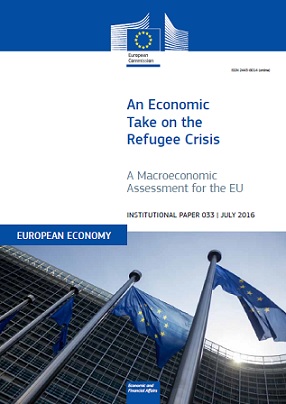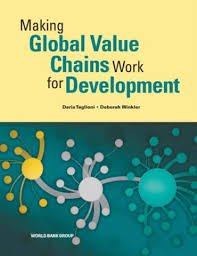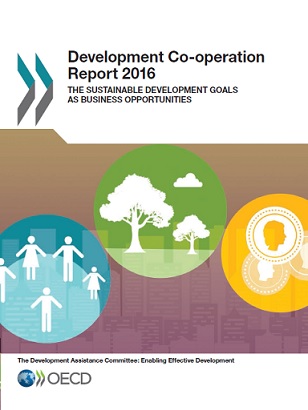Hug, Adam, (2016), “Europe and the people: Examining the EU’s democratic legitimacy”, The Foreign Policy Centre, Ιούνιος The European Union finds itself at a critical juncture. The long-term political impacts of the 2008 economic crisis and the rising pressures of globalisation have helped to drive public distrust in traditional sources of influence and authority. As a supranational institution trying to bring together the disparate wills of 28 member state publics …Read More
An Economic Take on the Refugee Crisis
European Commission, (2016), “An Economic Take on the Refugee Crisis”, European Commission, Institutional Paper 033, Ιούλιος Europe is facing an unprecedented surge in the number of asylum seekers and refugees. These flows have put considerable strain on public authorities in several Member States. From a purely macroeconomic point of view, the impact appears moderate, stemming in the short term from increased public spending and, over time, a slight rise in labour …Read More
How income inequality affects euro area current account imbalances
Marzinotto, Benedicta, (2016), “How income inequality affects euro area current account imbalances”, LSE Europpblog, 27 Ιουλίου Since the late 2000s financial crisis, a great deal of attention has been focused on the issue of how inequality affects the lives of citizens. But can inequality also explain some of the macroeconomic trends present in European countries? Benedicta Marzinotto writes on the link between inequality and current account imbalances in the Eurozone. Using …Read More
External and Public Debt Crises
Arellano, Cristina, Atkeson, Andrew, Wright, Mark, (2016), “External and Public Debt Crises”, NBER Macroeconomics Annual, Volume 30 Number 1 At the end of the first decade of the twenty-first century, the members of two advanced monetary and economic unions, the nations of the euro zone and the US States, experienced debt crises with spreads on government borrowing rising dramatically: in a short period of time, Californian spreads rose sixfold, Italian rose tenfold, Illinois fifteenfold and …Read More
The insurance sector and systemic risk
Gelos, Gaston, Valckx, Nico, (2016), “The insurance sector and systemic risk”, Voxeu, 27 Ιουλίου In recent years, the life insurance sector has become more systemically important across advanced economies. This increase is largely due to growing common exposures and to insurers’ rising interest rate sensitivity. This column analyses the evolution of the insurance sector’s contribution to systemic risk. Overall, life insurers do not seem to have markedly changed their asset portfolios …Read More
Making Global Value Chains Work for Development
Taglioni, Daria, Winkler, Deborah, (2016) “Making Global Value Chains Work for Development”, World Bank, Ιούνιος Economic, technological, and political shifts as well as changing business strategies have driven firms to unbundle production processes and disperse them across countries. Thanks to these changes, developing countries can now increase their participation in global value chains (GVCs) and thus become more competitive in agriculture, manufacturing and services. This is a paradigm shift from the 20th …Read More
Credit booms and macrofinancial stability
Dell’Ariccia, Giovanni, Igan, Deniz, Laeven, Luc, Tong, Hui, (2016), “Credit booms and macrofinancial stability”, Economic Policy, Volume 31, Issue 86, 31 Μαρτίου This paper explores several questions about credit booms and busts: When do credit booms occur? When do they end up in busts, and when do they not? What are the implications for different policies if curbing credit growth and/or mitigating the associated risks is an objective? We find that credit booms are often associated …Read More
Development Co‑operation Report 2016: The Sustainable Development Goals as Business Opportunities
OECD, (2016), “Development Co-operation Report 2016: The Sustainable Development Goals as Business Opportunities”, OECD Publishing, Paris, 18 Ιουλίου The face of development has changed, with diverse stakeholders involved – and implicated – in what are more and more seen as global and interlinked concerns. At the same time, there is an urgent need to mobilise unprecedented resources to achieve the ambitious Sustainable Development Goals (SDGs). The private sector can be …Read More
EU experimentalist governance in times of crisis
Zeitlin, Jonathan, (2016), “EU experimentalist governance in times of crisis”, West European Politics, Volume 39, Issue 5, 9 Ιουνίου This paper analyses the evolution of EU governance since the financial and eurozone crisis from an experimentalist perspective. It argues that EU governance in many key policy domains continues to take the form of an experimentalist decision–making architecture, based on a recursive process of framework goal–setting and revision through comparative review of implementation experience …Read More
Optimal Adjustment Paths in a Monetary Union
Belke, Ansgar, Gros, Daniel, (2016), “Optimal Adjustment Paths in a Monetary Union”, CEPS Working Document No. 424, Ιούλιος Adjustment to an external imbalance is more difficult within a monetary union if wages are sticky. Periods of high unemployment are usually necessary to achieve the required real depreciation (internal devaluation). Gradual adjustment is usually recommended to distribute the output and employment cost over time. This paper takes into account that gradual adjustment also …Read More







